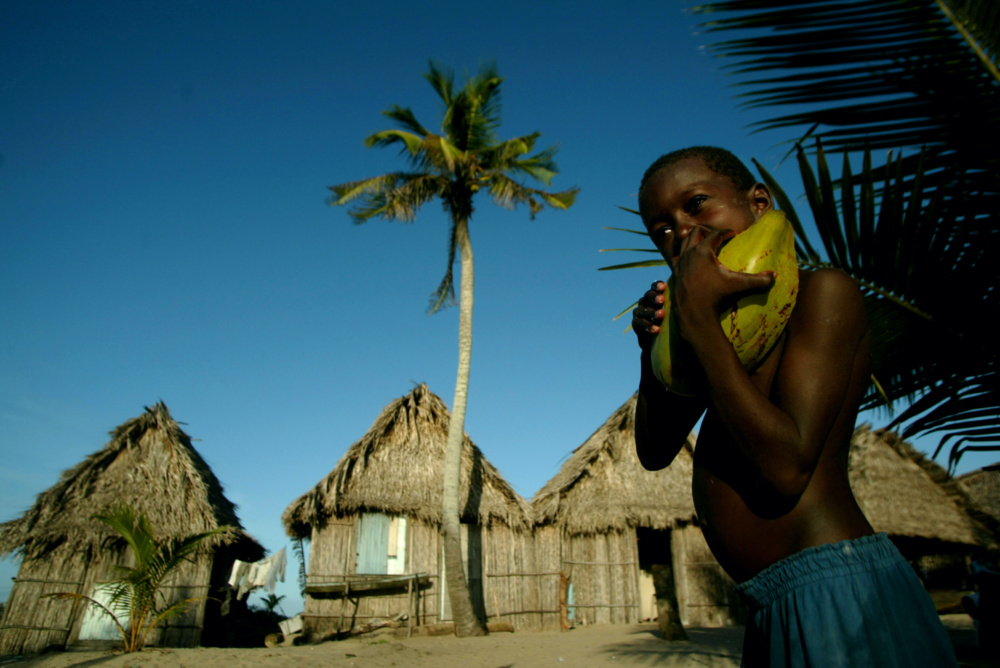Bogota, Colombia
Thomson Reuters Foundation
Indigenous cultures in the Caribbean, struggling as their tourism-dependent economies are ravaged by the coronavirus pandemic, are returning to traditional farming and fishing roots for their livelihoods, local experts said last week.
Being forced to look to older, more organic ways of survival can be a silver lining within the devastation of the pandemic, connecting communities with their history, they said in an online meeting held by the Organization of American States.

A young Garifuna boy eats a coconut near his home on 19th November, 2004 in the small, coastal village of Miami, Honduras. Descendants of escaped slaves who mingled with Carib Indians on the island of St. Vincent, the Garifuna were deported by the English in 1797. They now live along the Atlantic coasts of Honduras, Guatemala, Nicaragua, and Belize. Their lifestyle, based on their language, religion, fishing and music is most clearly preserved in Honduran villages like Miami. PICTURE: Reuters/Daniel LeClair/File photo.
Caribbean nations, so economically dependent on tourism, have seen a plunge in visitors due to lockdowns, closed borders and airport shutdowns throughout the region.
The coronavirus lockdown is expected to cause a 6.2 per cent contraction of the Caribbean economy in 2020, largely fueled by a stop in tourism, according to the International Monetary Fund.
Caribbean countries have reported more than 120,000 cases of COVID-19 and more than 2,000 deaths.
“COVID has given us an opportunity to really evaluate ourselves,” said Uwahnie Martinez, a member of the Garifuna people, who are descended from Central American natives and shipwrecked African slaves.
“We have been far removed from who we are and our culture, and this is the time we can actually look within and incorporate what our ancestors have left for us,” said Martinez, who runs and owns the Palmento Grove Garifuna EcoCultural & Fishing Institute, an Indigenous tourism business in Belize.
“Given our livelihood of fishing and farming, we are actually reverting back to this. We are seeing more fishermen going out,” she said. “We are returning to our farming roots.”
Faced with a decline in tourism revenue, Garifuna communities in southern Belize are raising chickens to feed their families or to sell and are growing herbal gardens for traditional medicine, she said.
“I like the idea of going back to farming. I’m hearing that a lot from Caribbean countries,” said Kim Hurtault-Osborne, head of integral development at the OAS, which promotes regional business and tourism.
Locals are returning to fishing for food, she said.
Fewer than five people have died from COVID-19 in Belize.
The return to cultural roots can empower communities and reduce their economic dependence on tourism led by big resorts “that don’t give a damn about us,” Martinez said.
“Cultural tourism has so much to offer…but we’re so much focused on just putting indigenous people out there as circus clowns, and that must stop,” she said.
Indigenous tourism typically includes visits to Garifuna villages where visitors learn about the culture’s drum music and cassava bread-making traditions, Martinez said.
In Guyana, on South America’s Caribbean coast, the government is working with Indigenous communities so they can reopen their lodges and tourism businesses safely, said Carla James, who heads the government’s Guyana Tourism Authority.
About two dozen COVID-19 deaths have been reported in Guyana.
Local communities are getting free training on COVID-19 safety protocols, along with cleaning products, masks and other protective equipment, James said.
Tours have been run virtually, and indigenous arts and crafts are being sold online during the pandemic, she said.
Decisions are yet to be made about reopening to tourism, she said.
“When the community decides that they are ready, when they are confident enough to host guests, that’s when they will reopen,” James said.






